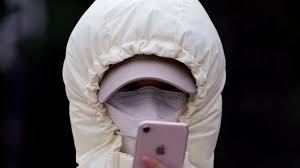Chinese citizens use tracker apps to avoid infected neighbourhoods
Chinese citizens are using mapping programmes and travel trackers in a bid to avoid neighbourhoods with infections of the coronavirus and to better prepare for the dangers they face.
Both data mapping company QuantUrban and a third-party Wechat mini-program developer have created platforms that take official information on the neighbourhoods where confirmed cases live and map it geographically so that users can guage how close they are to infection sites.
While the WeChat programme, called “YiKuang” - or “Epidemic Situation”, covers the southern cities of Shenzhen and Guangzhou, QuantUrban’s browser-based maps also cover nine other cities in the province. “Shenzhen might have a major outbreak in the next few days, and government data comes out slowly,” said April, a Shenzhen-based manager who declined to give her full name.
“Seeing the map is a psychological comfort. You can’t guarantee there won’t be fresh cases, but you can avoid an area that’s already h i t , ” s h e said. Confirmed cases in Shenzhen have climbed rapidly to 245 as of Monday, making the southern tech capital the worst-affected of China’s main cities - Beijing, Shanghai and Guangzhou.
It has a large population of migrant workers from the heavily affected central provinces. “We wanted to annotate the information on the map so that the public could better see how epidemic sites are distributed more intuitively, and also remind everyone to make adequate protection,” said Yuan Xiaohui, QuantUrban’s co-founder and CEO.
Volunteers also help the team to keep the map up to date as the government releases data daily, she said. Yikuang also relies on volunteers to keep up to date and originally denoted neighborhoods with confirmed cases with a skull and crossbones logo. It has since changed to less alarming exclamation points after users on social media platform Weibo complained they would cause panic.
“If I know that there are sick people nearby, I can take steps to be extra cautious,” Steven Liu, a finance student, told Reuters. “I live between Shenzhen and Guangzhou, and these maps are really great there.” Cruise ships to ban recent China visitors: global body • More than 6,000 tourists were temporarily confined to their cruise ship at an Italian port last week Frankfurt am Main Cruise lines worldwide will deny boarding to passengers and crew who have recently travelled to China, a global industry body said Monday, as fears grow over the deadly new coronavirus.
In a statement, the Cruise Lines International Association (CLIA) said its members were taking extra precautions to prevent an outbreak of the virus on board cruise ships, where infections can spread rapidly.
“CLIA Members have suspended crew movements from mainland China and will deny boarding to any individual, whether guest or crew, who has travelled from or through mainland China within the previous 14 days,” the body’s Hamburg office said. CLIA represents some of the world’s largest and best-known cruise lines, including TUI, AIDA, MSC, Costa, Royal Caribbean and Carnival Cruises.
The cruise companies were also carrying out careful screening of passengers and crew before boarding, and changing itineraries where necessary, CLIA said.
The industry body added that cruise ships were well equipped to deal with health emergencies. “The cruise industry is one of the most well-equipped and experienced when it comes to managing and monitoring health conditions of passengers and crew,” the statement said. All ships are fitted with medical facilities and have medical professionals “available around the clock”, it added.
In a sign of growing anxiety, more than 6,000 tourists were temporarily confined to their cruise ship at an Italian port last week after two Chinese passengers fell ill. A ban on recent visitors to China Communities hunts for travellers from virus epicentre Beijing Communities in China are offering cash rewards, knocking on doors and questioning people trying to enter their neighbourhoods -- but they’re not looking for criminals.
They’re searching for anyone coming from Wuhan, the central city at the epicentre of a deadly virus epidemic that has sparked fear -- even panic -- in China and beyond. The end of the extended Lunar New Year holiday this weekend has raised concerns that the new coronavirus could spread further as people travel across the country.
In Beijing, neighbourhoods have sealed themselves off -– some with homemade barriers –- to force visitors or anyone returning home from the holiday to register their travel history. One district in northern Shijiazhuang city is even offering cash incentives of 2,000 yuan ($288) for reporting anyone who has travelled to Wuhan in the past two weeks.
For some communities, anyone who has visited central Hubei province -- of which Wuhan is the capital -- is no longer welcome at all. “Even if you live here, you can’t enter,” said a security guard at the entrance of a Beijing neighbourhood when asked about returning Hubei residents. “Those from Hubei could bring the infection here,” he said, wearing a blue mask.
“If you’re from Hubei, you have to notify the neighbourhood committee.” A week ago, China’s health commission urged villages around the country to leave “no blind spots” when investigating where people have travelled. But with the holiday ending on Monday, local governments are under pressure to root out those who have visited the hardhit province of Hubei.
“If they look unfamiliar or are dragging a suitcase, I’ll ask them to register,” said a woman working at a compound in Beijing. “I’m pretty worried,” she added, only offering her surname, Mei.
Passengers arriving in Beijing are being checked for fever, a symptom of the coronavirus infection The ultrastructural morphology exhibited by the 2019 Novel Coronavirus (2019- nCoV), which was identified as the cause of an outbreak of respiratory illness first detected in Wuhan, China, is seen in an illustration released by the Centers for Disease Control and Prevention (CDC) in Atlanta, Georgia, U.S
Related Posts

